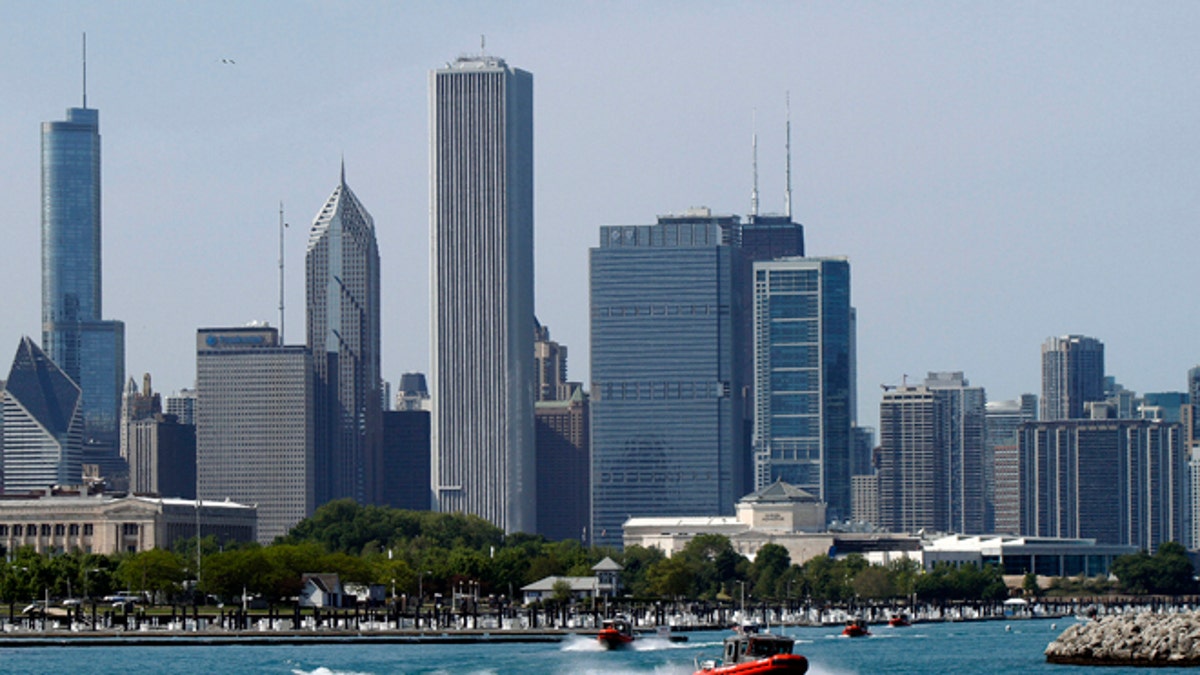
FILE: May 17, 2012: Chicago's skyline is seen as U.S. Coast Guard boats leave Burnham harbor on Lake Michigan, near McCormick Place, in Illinois. (REUTERS)
The recent bankruptcy filing in Detroit is raising red flags about other major U.S. cities also dealing with billions in under-funded retiree benefits, prompting the question -- who might be next?
Just last week, Chicago’s credit rating was downgraded as a result of its $19 billion in under-funded pension liabilities.
Moody's Investors Service called the liabilities “very large and growing" and warned that Chicago, the country’s third-largest city, faces a “tremendous strain’’ in trying to meet future funding requirements and public safety demands.
A similar scenario, though decades in the making, largely doomed Detroit, whose average police response time has grown to more than 50 minutes.
And like Michigan, which appears in no position to bail out Detroit, Illinois is dealing with its own $97 billion pension shortfall.
To be sure, other smaller cities have filed for bankruptcy, most notably California’s Stockton and San Bernardino in 2012. No other city of Detroit's size appears to be on the cusp of imminent financial collapse.
However, those bankruptcy filings together have resulted in speculation about whether more are on the horizon.
"I would hope cities are looking at their under-funded liabilities and the health care costs associated with future and current retirees," Michael LaFaive, director of fiscal policy at the Michigan-based Mackinac Center for Public Policy, told FoxNews.com.
Timothy Blake, managing director of Moody’s Investor Services, told Reuters that cities successfully cutting debt and other liabilities in bankruptcy court might lead to more filings.
“We have to acknowledge there is a trend,” Blake said. “If the outcome is that they do reduce some of these liabilities, that could be an incentive for the filing.”
However, Standard and Poor's, another top financial-analysis firm, called the Detroit filing “idiosyncratic” and “not as a symptom of a wider issue”
“We do not anticipate a contagion effect,” S&P credit analyst Jane Hudson Ridley wrote after Detroit filed Thursday.
S&P officials also told FoxNews.com on Monday the firm thinks governments have a strong capacity and willingness to repay their debt despite some financial headwinds, that bankruptcy will limit access to credit markets and that municipalities cannot dismantle themselves, like companies do, to pay off debts.
Other cities now on the radar include Cincinnati, Minneapolis, Portland, Ore., and Santa Fe, N.M. -- following Moody’s saying in April that they and 11 other municipalities were being reviewed for a possible credit downgrade, the result of a new analysis system that further considers pension liabilities.
Though much of the national concerns have focused on pension liabilities, heath care costs for retired municipal employees pose an equally if not larger problem.
Amid the $18.5 billion in long-term debt that led Detroit to file for bankruptcy is roughly $3.5 billion in under-funded pension liabilities. However, roughly $5.7 billion of that debt is health care costs and so-called “other post-employment benefits.”
The situation is highlighted a Pew Charitable Trusts Study of 61 major U.S. cities that found they collectively had enough money to cover 74 percent of pension liabilities but only 6 percent of health care liabilities.
The total difference between what the cities owed to retired employees and what was covered equaled $217.2 billion, according the report, “A Widening Gap in Cities.” It was released in January and based on 2009 numbers, the most complete data at the time.
The nonprofit group also released a report in March that found New York City has a combined $1.15 billion in under-funded pension and health-care costs, followed by such major cities as Philadelphia, at $8.6 billion. In comparison, that figure for Detroit was $12.9 billion.
Baltimore is also among the most under funded cities regarding retiree health care, when considering how much it would cost individual households. The amount is $10, 208 per household.




